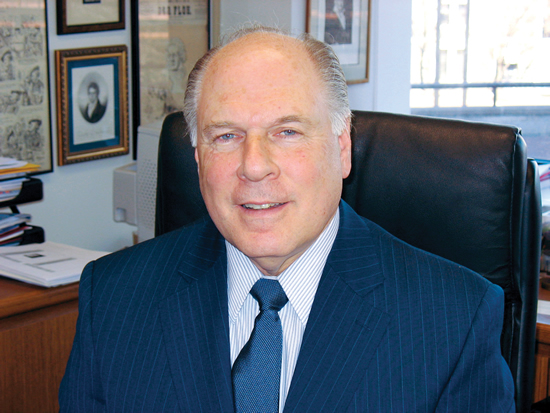MERCY COLLEGE - THE DEAN’S COLUMN
On Testing
By Alfred Posamentier & Gene Maeroff

Alfred Posamentier
Are students in our elementary and secondary schools taking too many tests? It is starting to look that way and no respite is in sight.
Now, states are planning to assess the performance of students as a way to evaluate their teachers. Never mind that student outcomes also reflect the influence of the home and out-of-school factors like peer pressure and tutoring.
All of this comes alongside pop quizzes, standardized examinations that tell whether students are performing on grade level, assessments by the federal government that compare students in one state with those in other states, new examinations that measure progress as students move through the grades to find whether they will be ready for college, entrance examinations for college that students take in high school, and exit tests to get out of high school.
Not all testing is of the high stakes variety. Periodic appraisal is appropriate to see if students are achieving what teachers expect them to learn. These tests, referred to as formative assessment, contrast with the summative assessment in which the stakes are high, deciding, for instance, whether students get promoted to the next grade or receive their diplomas.
It makes sense to judge the performance of students, teachers, and schools. Yet laudable goals sometimes seem subverted by the heavy burden of tests, which cumulatively rob students of increasing amounts of instructional time and raise the level of anxiety for everyone involved. Cheating scandals arise ever more frequently as the stakes rise. Witness the alleged behavior of educators in Atlanta who are now caught up in the justice system.
Entirely too much time is spent in some classrooms in test preparation, hours that teachers might better devote to engaging students with meaningful content. Who ever thought that test preparation would grow into what amounts to a subject in itself? In some locales pressure for better scores led schools to deemphasize subjects that are not tested, especially music and art and, sometimes, social studies.
The ubiquity of the multiple-choice examination detracts from critical thinking and problem solving, sacrificing depth for brevity. The Common Core Curriculum that is now on the horizon in most states is supposed to lead to deeper learning. Chances are, though, that the new tests of the Partnership for Readiness for College and Career (PARCC) that will accompany the Core Curriculum will be replete with multiple-choice questions.
Schools certainly should be accountable. But the time has arrived to determine whether the abundance of testing is counterproductive. There are possibilities other than having every student take a test to find out how well students in general are progressing or how a school is doing. The federal government’s National Assessment of Educational Progress, for example, uses matrix testing in which each question is not given to every student. A composite outcome reveals what has to be known.
The pressure to prepare students for tests should not be so great that teachers lose their enthusiasm for teaching. They should feel free to provide enrichment in a subject even if it moves the lesson away from material that will be on the test. Nor should the pressure prevent students from pursuing learning simply for the sake of learning. Testing is the obverse side of the instructional coin and society ought to wonder about a currency that could be debased by too much testing. #
Alfred S. Posamentier is Dean of the School of Education, and Professor of Mathematics Education, Mercy College, New York; Gene I. Maeroff is the Founding Director of the Hechinger Institute at Teachers College, Columbia University and President of the Edison, New Jersey School Board
